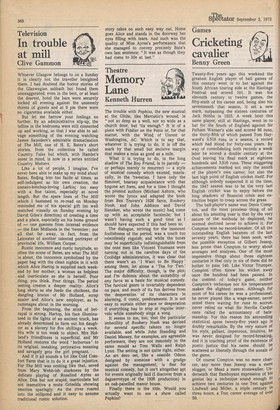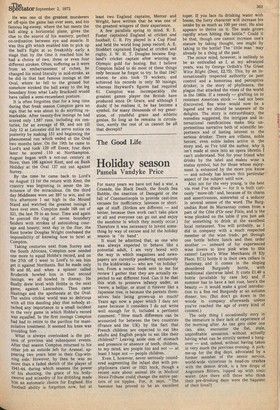Games
Cricketing cavalier
Benny Green
Twenty-five years ago this weekend the greatest English player of ball games of this century went in to bat against the South African touring side at the Hastings Festival and scored 101. It was his eleventh century in twelve games, the fifty-sixth of his career and, being also his seventeenth that season, it set a new mark, surpassing the sixteen centuries of Jack Hobbs in 1925. A week later this same player, still at Hastings, went in to bat for the South of England against Sir Pelham Warner's side and scored 86 runs, the thirty-fifth of which passed Tom Hayward's 3,518 runs in a season, a record which had stood for forty-one years. By way of consolidating both records a week later he scored a double century at the Oval leaving his final mark at eighteen hundreds and 3,816 runs. These staggering achievements marked not only the zenith of the player's own career, but also the last high point of English cricket itself. For although nobody suspected it at the time, the 1947 season was to be the very last English cricket was to enjoy before the long shadows of financial crisis and extinction began to creep across the grass.
The ball-player's name was Denis Compton, and the most priceless thing of all about his amazing year is that by the very nature of the methods he deployed, he seemed destined never to achieve it. For Compton was no record-breaker. Of all the outstanding English batsmen of the last seventy years, there has been non, with the possible exception of Gilbert Jessop, less prone than Compton to worry about averages and analyses. One of the most impressive things about those eighteen centuries is that only in six of them did he bother to pass 140. Like Victor Trumper, Compton often threw his wicket away once the hundred had been passed. In the context of today's game, neither Compton's technique nor his temperament makes the slightest sense. Although for most of his career he was a professional, he never played like a wage-earner, never stood there waiting for runs to accrue, never relied on what Sir Neville Cardus once called the accountancy of batsmanship. For this reason his astounding statistical spree twenty-five years ago is doubly remarkable. By the very nature of his style, gallant, impetuous, intuitive, he was never designed for record-breaking, and it is touching proof of the existence of poetic justice that his name should be scattered so liberally through the annals of the game.
Of course Compton was no mere chair cer, any more than Jessop was a mere slogger, or Mead a mere stonewaller. Underneath that flamboyant expression of his genius lay a technique sound enough to achieve two centuries in one Test against Lindwall and Miller, a triple century in three hours, a Test career average of over 50. He was one of the greatest murderers of off-spin the game has ever seen, and his famous leg-sweep. where the bat meets the ball along a horizontal plane, gives the clue to the source of his mastery, perfect co-ordination between eye and muscle. It was this gift which enabled him to pick up the ball's flight at so freakishly early a stage that by the time it reached him he had a choice of two, three or even four different strokes. Often, suffering as it were from an embarrassment of riches, he changed his mind literally in mid-stroke, as he did in that last famous innings at the Oval, where he fell to the ground but somehow stroked the ball away to the leg boundary from what Lady Bracknell would have called a semi-recumbent posture.
It is often forgotten that for a long time during that freak season Compton gave no sign that he was about to do anything remarkable. After twenty-five innings he had scored only 1,587 runs, including six centuries, for an average of 69, and not till July 12 at Leicester did he serve notice on posterity by making 151 and beginning the phenomenal run which ended at the Oval two months later. On the 19th he came to Lord's and took 129 off Essex; four days later he scored 110 at Northampton. August began with a not-out century at Hove, then 106 against Kent, and on Bank Holiday at the Oval 137 not out against Surrey.
By the time he came back to Lord's on August 13 for the return with Kent, the country was beginning to sense the imminence of the miraculous. On the third day Middlesex were set 397 to win, and on this afternoon I sat high in the Mound Stand and watched the greatest innings I have ever seen. Compton made 168 out of 321, the last 70 in an hour. Time and again he pierced the ring of seven boundary fielders with strokes of astonishing courage and beauty; next day in the Star, the Kent bowler Douglas Wright confessed the impossibility of knowing how to bowl at Compton.
Taking centuries next from Surrey and the South Africans, Compton now needed one more to equal Hobbs's record, and, on the 27th off I went to Lord's to see him get it against Northants. But he made only 60 and 85, and when a spinner called Broderick bowled him in that second innings, we all howled in dismay. He finally drew level with Hobbs in the next game, against Lancashire. Then came Hastings and the apotheosis at the Oval. The entire cricket world was so delirious With all this dazzling play that nobody attached any importance to a small incident in the very game in which Hobbs's record was equalled. In the first innings Compton had had to retire to the pavilion for manipulative treatment. It seemed his knee was troubling him . . .
What is always overlooked is the pattern of previous and subsequent events. After that season Compton returned to his Other job as outside left for Arsenal, appearing two years later in their Cup-winning side. However, by then he was no more than a faded sketch of the player of 1941-44, during which seasons the power of his shooting, the grace of his bodyswerve and wizardry of his dribbling made him an automatic choice for England. His football ability is forgotten now, but at least two England captains, Mercer and Wright, have written that he was one of the greatest wingers of their experience.
A few parallels spring to mind. R. E. Foster captained England at cricket and football; C. B. Fry played in a Cup Final and held the world long jump record; A. E. Stoddart captained, England at cricket and rugby, J. W. H. T. Douglas became England's cricket captain after winning an Olympic gold for boxing. But I believe Compton failed to do most of these things only because he forgot to try. In that 1947 season he also took 73 wickets, and achieved his records in only 50 innings, whereas Hayward's figures had required 61. Compton was incomparably the greatest games player the British have produced since Dr Grace, and although I doubt if he realises it, he has become a symbol, for many thousands of my generation, of youthful grace and athletic genius. So long as he remains in circulation, surely the rest of us cannot be all that decrepit?







































 Previous page
Previous page